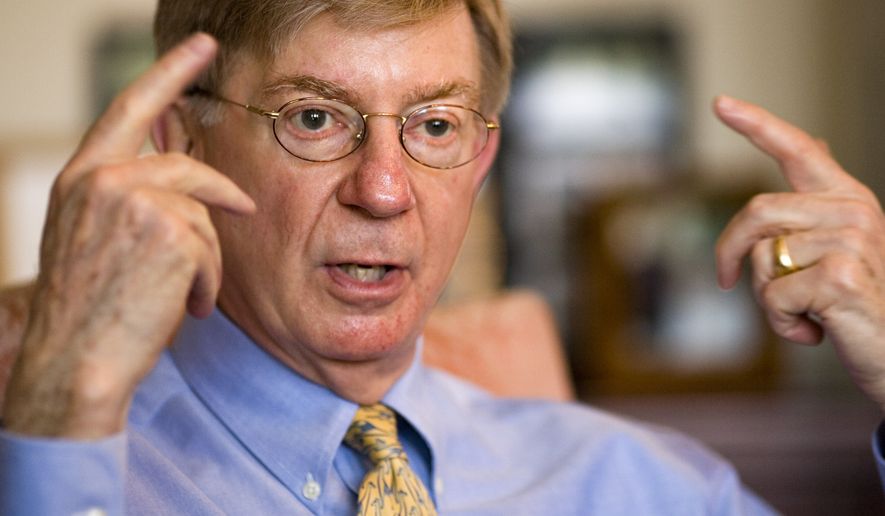As a voice of the #NeverTrump movement on Denver talk radio in 2016, Krista Kafer clashed with callers, quit the Republican Party when Donald Trump clinched the nomination and, after he won the White House, eventually lost her radio job.
She better understands now what Mr. Trump’s supporters see in him, she said, but she hasn’t changed her opinion about the man.
“Everything I predicted would happen did happen. He’s not getting any more presidential, he’s stepped up his attacks on opponents as well as the press,” said Ms. Kafer, who continues to pen a column for The Denver Post that occasionally jabs the president’s policies.
She added, “I’m basically in the same position.”
Nearly two years into the Trump presidency, there is still a die-hard anti-Trump faction among conservatives and the Republican Party establishment.
Many have suffered for bucking their party’s populist champion. Wisconsin talk radio’s Charlie Sykes also lost his job. Republican Sens. Jeff Flake of Arizona and Bob Corker of Tennessee chose to retire rather than face the wrath of Trump voters.
Despite praising his tax cuts, deregulation and Supreme Court picks, anti-Trump conservatives such as Ms. Kafer won’t countenance the populist wave that overtook the Republican Party.
Any chance she would vote to re-elect Mr. Trump in 2020?
“It’s unlikely,” she said. “I realize what’s at stake, but I just don’t think he is a particularly good president. He debases the office. And he’s been bad for Republicans.”
The #NeverTrump numbers dwindled as the party’s rank and file fell in line behind Mr. Trump, giving him one of the modern era’s highest presidential job approval ratings within his own party.
Trump-backed candidates have dominated Republican primaries this year, cementing the president’s imprint on the party.
“It’s pretty clear that the ’NeverTrump’ wing of the party is in the extreme minority and that the numbers have declined from the campaign to today,” said Tim Miller, who ran communications for the anti-Trump Our Principles PAC in 2016.
“While some have abandoned the party altogether, there is a small but committed number who are carrying the torch and largely holding to conservative principle, and these conservatives in exile are well-positioned to be a core part of the party’s rebuild should the Trump experiment flame out,” he said.
Ford O’Connell, a Republican strategist closely allied with Mr. Trump, said the #NeverTrump holdouts were just “outliers yapping in the media.”
“It is not good business to be against a president who 85 to 90 percent of the party is with,” he said. “Further, the outlandish antics of the Democrats and media have forced others to fall in line because they realize the fight is bigger than themselves or Trump.”
Not for Bill Kristol, founder and editor at large for The Weekly Standard, which has become a clearinghouse for conservative resistance to the president and regularly lampoons him on its cover.
Mr. Kristol argues that Mr. Trump’s popularity in the party is overstated and notes that about half tell pollsters that they “somewhat approve.”
He is pushing for a Republican to challenge Mr. Trump in the 2020 presidential primaries.
“I don’t know if a challenger would succeed. In my view, I think it’s important to have one just to force the debate,” he said in a recent speech in New Hampshire. “I think if Trump were to lose in 2020 it would allow for someone to step up and say, ’Well, here’s a different way forward than just kind of trying to redo Trump over the next several years.’ “
The leading anti-Trump Republicans, Mr. Flake and Ohio Gov. John Kasich, have not ruled out a challenge.
Columnist George Will, who quit the Republican Party when Mr. Trump won the presidential nomination, went so far as to urge conservatives to vote Democrat in this year’s midterm elections to gut the party, which he said had become Mr. Trump’s “plaything.”
That was the best way, he said, to restore the party.
Stuart Stevens, a Republican consultant who worked with President George W. Bush and Mitt Romney, said the term “NeverTrump movement” is a misnomer.
“It’s not like we talk or conspire or anything,” he said. “It is interesting, to me anyway, that there is a group of us who all worked for Bush who seem pretty much in sync. … But I think that’s just because what drew us to Bush is so lacking in Trump.”
While insisting he wasn’t part of a plot to retake the Republican Party and wouldn’t predict its future, Mr. Stevens lamented the shape of the party.
“If you believe that the Republican Party was the party of character counts, personal responsibility, strong on Russia, the national debt, respect for law enforcement institutions, then it is pretty unrecognizable in the form of Trump,” he said.
“He embodies what we always said was the Democratic position — probably unfairly so, but we did,” he said. “We mocked Dems for being the party in search of grievance as opposed to personal responsibility, and Trump is the greatest grievance candidate in modern political history. He wakes up in search of something to feel slighted about and is usually not disappointed.”
He continued, “Maybe all that stuff — character counts, personal responsibility, tough on Russia — were just marketing slogans to be discarded when a new car line was introduced. It’s just no one ever told me that. I was dumb enough to believe it. Where does the party go from here? The RNC endorsed [accused pedophile and Alabama Senate candidate] Roy Moore, so clearly I have no idea.”
• S.A. Miller can be reached at smiller@washingtontimes.com.




Please read our comment policy before commenting.